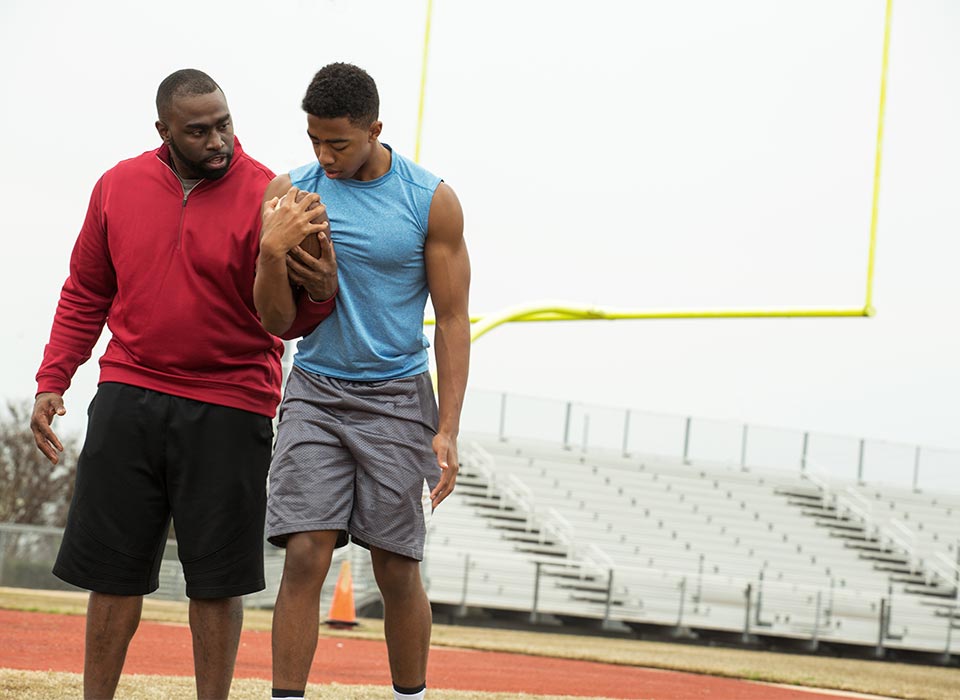From the bleachers, fans of the game only get a small glimpse into the world of the student-athlete under the microscope of the gymnasium lights. But after the final buzzer and before the next tip off, the work of the student-athlete continues.
Class.
Practice.
Homework.
Weight training.
Exams.
Travel teams.
Parents of student-athletes, on the other hand, get a bird’s eye view of the year-round grind, and it can be difficult to know what their child may need in certain situations. Do they need a moment of parental advice or just an ear to listen? Is this a time for a coaching tip or for encouragement as their number one fan?
The issues of the student-athlete have been a consistent theme throughout my life. Once a student-athlete who competed for state-titles on the basketball court myself, I am now both an assistant varsity basketball coach and a sports medicine physician who treats high school and collegiate athletes.
Maybe even more importantly, I am an extremely proud father to a now retired student-athlete. Having played the role of his parent, his biggest fan, and at times his head coach, the aforementioned questions were on my mind every single day throughout his athletic career.
And through the ups and downs of that journey, here are the lessons I learned and the advice I encourage all student-athlete parents to consider.
It’s Student-athlete. Not Athlete-Student.
No matter how talented an athlete your child may be, academics always come first. Only 2% of athletes make it to the pros, and schools often require student-athletes to meet a minimum grade point average to be eligible for athletic competition.
Ensure they have plenty of time to finish homework and study for quizzes, tests, and finals. If extra help is needed in the classroom, consult with your child’s teachers and coaches, and find a tutor if necessary.
Let the Coach coach.
Parents want the best for their children both on the field and in life and letting someone else make important decisions regarding your child’s athletic career is not easy. But the coach is the coach for a reason. It’s your job to be the best fan you can be for your child and the entire team.
Volunteer to bring snacks. Make signs for players. Be the loudest person in the stands.
If you do have a concern about something, speak with the coach or athletic director politely with-out overstepping any bounds. If your child has voiced a concern such as about playing time, en-courage your child to talk with the coach. Yes, that may be intimidating, but it is a valuable life lesson for the student-athlete to talk to their superiors on their own.
What if you are both the parent and the team’s coach?
Admittedly, that can get tricky.
It is crucial for you to separate both roles and treat your child and their teammates equally. At home, you are the parent. On the court or field, you are the coach. Obviously, there is some overlap between these two roles. If at home your child wants some extra practice, of course you can be the coach. If after the game your child needs a moment of parental celebration or encouragement, remember your first role is to be their biggest champion.
Listen first.
After a bad game, the last thing most student-athletes want to hear from their parents is a critique of their performance. If your child wants to vent, let them vent. If they want to sit in silence, sit in silence.
You are their number one fan. And as a fan, sometimes the best thing you can do is just to listen. Your child probably knows why they didn’t play well, and they don’t always need someone else to break down the flaws in their game. When it feels like it is your turn to say something in the post-game conversation, remind your child of something positive they did during the match.
Encourage rest.
A student-athlete’s schedule is, well, crazy.
They get up early for morning workouts before school. Then, they have class from 8 a.m. to 3 p.m. After class, it’s practice or a game. Finally, they go home and do homework.
Repeat day-in and day-out.
There often isn’t a true offseason for student-athletes either. Many of them play multiple sports or play on travel teams during the summer.
In the go-go-go world of the student-athlete, a moment of rest should be taken advantage of. To help avoid a sensation of feeling burned out, find ways to help your child relax when they can.
Rest will help both their emotional and physical well-being, providing an opportunity for their mental batteries to recharge and for their bodies to recuperate.
Suggest healthy food choices.
Finding time to eat a well-balanced diet during their intense schedules can be challenging. Grabbing quick, unhealthy foods may be easier in the moment, but athletes who eat healthily perform better.
Student-athletes are burning calories constantly, and any help you can offer in providing healthy meals will go a long, long way. Depending on the sport(s) your child may play, the diet they need will differ. A cross-country runner won’t eat the same meals as a basketball center. Do some research to find the right dietary balance for your child. If extra dietary help is needed, consider consulting a sports nutritionist.
A student-athlete’s success isn’t achieved alone. With the right support behind the scenes at home, you will see your child’s confidence in the classroom and on the playing field rise.
And no matter the school, the sport, or the setting, you’ll be there cheering them on the whole way!
